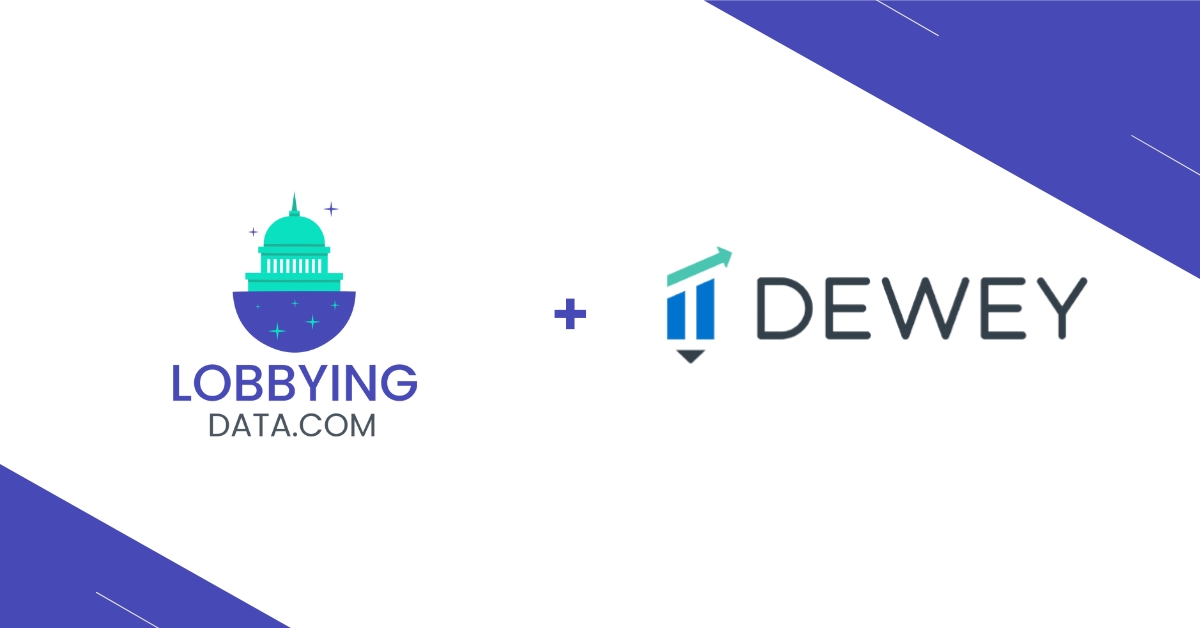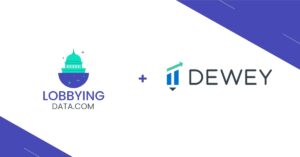Unlocking the Power of LobbyingData.com to Make Informed Decisions
In today’s fast-paced political and business landscapes, it is crucial to stay informed about the latest lobbying activities and political developments that may impact your industry. That’s where LobbyingData.com comes in – a powerful platform that provides access to lobbying data and insights that can help you make informed decisions. In this article, we will explore why understanding the importance of lobbying data is essential, and how to utilize LobbyingData.com’s advanced features to gain strategic insights and competitive intelligence.
Understanding the Importance of Lobbying Data
Lobbying data refers to information about the interactions between lobbyists and government officials, including information about the lobbyists, clients, issues, and amounts spent. This data can provide valuable insights into political and business decision-making processes and help you stay ahead of the competition. Understanding the role of lobbying in politics and business is critical to unlocking the full potential of lobbying data.
The Role of Lobbying in Politics and Business
Lobbying is a process of advocating for a specific policy or decision by influencing government officials or public officials. The primary goal of lobbying is to create a favorable regulatory and legislative environment for a particular industry, company, or organization. By identifying key decision-makers, understanding their interests, and tailoring the message accordingly, lobbyists can influence the decision-making process and achieve their desired outcomes.
For example, a pharmaceutical company may hire a lobbyist to advocate for policies that would benefit their industry, such as tax breaks or reduced regulations. The lobbyist may meet with key lawmakers, provide them with research and data supporting their position, and work to build relationships with those lawmakers to increase the likelihood of success.
Similarly, a nonprofit organization may hire a lobbyist to advocate for policies that align with their mission, such as increased funding for a particular social program. The lobbyist may work to educate lawmakers and their staff on the issue, organize grassroots campaigns to build support, and coordinate with other organizations to increase their collective impact.
The Impact of Lobbying on Decision-Making
Political and business decision-making processes can be complex and convoluted, and lobbying can have a significant impact on the outcome. Lobbyists can provide valuable information and insights to policymakers and help shape the policy agenda. They can also use their influence to prevent unfavorable policies from being passed or implemented. Therefore, having access to lobbying data can provide critical information regarding who is involved, how much money is being spent, and what issues are being advocated for or against.
However, the influence of lobbying is not always positive. Lobbyists may use unethical or illegal tactics to achieve their goals, such as bribery or misrepresentation. In some cases, lobbying can lead to policies that benefit a small group at the expense of the broader public. For example, a company may lobby for a tax break that benefits them but does not contribute to the overall economy.
Therefore, it is important to have transparency and accountability in the lobbying process. Laws and regulations exist to ensure that lobbying activities are disclosed and that lobbyists adhere to ethical standards. By understanding the role of lobbying in politics and business and having access to lobbying data, individuals and organizations can make informed decisions and hold their representatives accountable.
Getting Started with LobbyingData.com
LobbyingData.com is a user-friendly platform that provides access to lobbying data from federal, state, and local governments. Here’s how to get started:
Creating an Account and Setting Up Your Profile
To access LobbyingData.com, you need to create an account and set up your profile. This process is straightforward, and you can create an account within minutes. Once you’ve created an account, you can customize your profile and set up notifications to stay informed about the latest lobbying activities that are relevant to your interests.
When you create an account, you will be asked to provide some basic information such as your name, email address, and a password. You can also choose to add additional information to your profile, such as your occupation, industry, and interests. This information will help LobbyingData.com provide you with more personalized results and recommendations.
Navigating the Platform and Key Features
Navigating the LobbyingData.com platform is intuitive, and the interface is user-friendly. The key features of LobbyingData.com include:
- Search by lobbyist, client, or issue
- Filter results by date, amount, and location
- Analyze trends and patterns in lobbying activities
- Assess the effectiveness of lobbying campaigns
- Monitor competitor lobbying efforts
Once you’ve logged in to your account, you can start exploring the platform and its features. The search bar at the top of the page allows you to search for specific lobbyists, clients, or issues. You can also use the filters on the left-hand side of the page to narrow down your results by date, amount, and location.
One of the most powerful features of LobbyingData.com is its ability to analyze trends and patterns in lobbying activities. By looking at data over time, you can see which issues are becoming more or less popular, which lobbyists are gaining or losing influence, and which clients are spending the most money on lobbying efforts.
Another useful feature is the ability to assess the effectiveness of lobbying campaigns. By comparing lobbying spending to legislative outcomes, you can see which campaigns are having the most impact and which ones are falling short.
Finally, you can use LobbyingData.com to monitor your competitors’ lobbying efforts. By tracking their spending and activities, you can gain insights into their priorities and strategies.
In conclusion, LobbyingData.com is a valuable tool for anyone interested in lobbying activities at the federal, state, and local levels. By creating an account and exploring its features, you can gain valuable insights into the world of lobbying and stay informed about the latest developments in your industry or area of interest.
Utilizing Advanced Search and Filtering Options
LobbyingData.com offers advanced search and filtering options that allow you to find specific information about lobbying activities that are relevant to your interests. Here are some of the features:
Searching by Lobbyist, Client, or Issue
Are you interested in finding out more about a specific lobbyist or client? Or maybe you want to know more about a particular issue that is being lobbied for or against? LobbyingData.com’s advanced search feature allows you to do just that. By searching by lobbyist, client, or issue, you can easily find the information you need and track their activities over time. This feature is especially useful for journalists, researchers, and policy analysts who need to stay up-to-date on lobbying activities.
Filtering Results by Date, Amount, and Location
Do you want to know how much money was spent on lobbying activities in a specific region or during a particular time period? Or maybe you want to see how much money was spent by a particular organization on lobbying efforts? LobbyingData.com’s filtering feature allows you to narrow down your search results by date, amount spent, and location. This feature is helpful when you are trying to gain specific insights about lobbying activities in a particular region or timeline.
For example, let’s say you are interested in learning more about lobbying activities related to climate change. By using the search feature to find all lobbying activities related to climate change, you can then use the filtering feature to narrow down your results to only show activities that occurred in the past year and were conducted in Washington, D.C. This will give you a more focused view of the lobbying efforts related to climate change in the nation’s capital.
In summary, LobbyingData.com’s advanced search and filtering options provide users with a powerful toolset for finding specific information about lobbying activities. Whether you are a journalist, researcher, or policy analyst, these features can help you stay up-to-date on the latest lobbying activities and gain valuable insights into the world of political influence.
Analyzing Lobbying Data for Strategic Insights
To gain strategic insights from lobbying data, it’s essential to analyze the information and identify trends and patterns. Here are some ways you can analyze LobbyingData.com:
Identifying Trends and Patterns in Lobbying Activities
By analyzing lobbying data, you can identify trends and patterns that can help you anticipate regulatory changes, industry shifts, or emerging issues. For example, if you notice that a particular industry or company is spending more money on lobbying activities, it may indicate that they are anticipating regulation or legislation that could impact their business.
You can also identify trends in the issues that are being lobbied for or against. This can help you understand what issues are most important to different industries and organizations, and how those issues may change over time. For example, if you notice that a particular industry is consistently lobbying for tax breaks or other financial incentives, it may indicate that they are facing financial challenges that need to be addressed.
Another way to identify trends is by analyzing the types of lobbying activities that are being used. For example, if you notice that more organizations are using grassroots lobbying or social media campaigns, it may indicate a shift in the way lobbying is being done.
Assessing the Effectiveness of Lobbying Campaigns
By using lobbying data, you can assess the effectiveness of lobbying campaigns and identify which strategies and tactics are most successful. Understanding what works and what doesn’t can help you create more effective lobbying campaigns that achieve your desired outcomes.
One way to assess effectiveness is by looking at the outcomes of lobbying efforts. For example, if a particular organization successfully lobbied for a change in legislation or regulation, it may indicate that their lobbying efforts were effective. On the other hand, if an organization spent a significant amount of money on lobbying but did not achieve their desired outcome, it may indicate that their lobbying strategies need to be reevaluated.
You can also assess effectiveness by analyzing the types of lobbying activities that are being used. For example, if you notice that organizations that use social media campaigns are more successful in achieving their desired outcomes, it may indicate that social media is an effective lobbying tool.
Overall, analyzing lobbying data can provide valuable insights into the world of lobbying and help organizations create more effective lobbying campaigns. By identifying trends and patterns and assessing the effectiveness of lobbying efforts, organizations can stay ahead of regulatory changes and emerging issues, and achieve their desired outcomes.
Leveraging LobbyingData.com for Competitive Intelligence
LobbyingData.com can be used to gain competitive intelligence and monitor the lobbying activities of competitors. Here’s how:
Monitoring Competitor Lobbying Efforts
You can use LobbyingData.com to monitor the lobbying activities of your competitors and identify potential threats or opportunities. By staying informed about the lobbying activities of your competitors, you can anticipate their moves and take preemptive action.
Gaining Insights into Industry Trends and Regulatory Changes
By analyzing lobbying data, you can gain insights into industry trends and regulatory changes that may impact your business. This information can help you stay ahead of the competition and make informed decisions about where to invest resources and how to adapt to regulatory changes.
Conclusion
LobbyingData.com is a powerful tool that can help you unlock the power of lobbying data and gain insights that can drive strategic decisions. By understanding the importance of lobbying data and utilizing LobbyingData.com’s advanced features, you can stay informed about the latest lobbying activities, identify trends and patterns, and gain competitive intelligence. So, if you are interested in making informed decisions, take the time to explore LobbyingData.com, and unlock its full potential.








